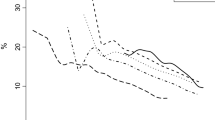Abstract
Household expenditure survey data can be used to provide information concerning the economic status and material well-being of families within and across countries. The purpose of this paper is two-fold: first, to describe the survey which is conducted in the United States (U.S.) to collect these data, and second, to present results from recent studies in which these data have been used to examine the distribution of household expenditures. We hope this paper will stimulate greater interest among researchers internationally to examine household expenditure data when addressing distributional issues. The paper is divided into four sections. Section one provides a description of the U.S. Consumer Expenditure Survey (CEX) and procedures. Section two includes results from analyses of the distribution of expenditures across households and the inequality in these expenditures. Section three discusses limitations of the CEX data. Section four is the summary and conclusions.
Access this chapter
Tax calculation will be finalised at checkout
Purchases are for personal use only
Preview
Unable to display preview. Download preview PDF.
Similar content being viewed by others
References
Biennia, J., Dippo, C. and Palmisano, M. (1987), Questionnaire Design: Report on the 1987 BLS Advisory Conference, Washington, D.C.: Bureau of Labor Statistics.
Dagum, C., Grenier, G. (1984). Male-Female Income Distributions in Four Canadian Metropolitan Areas: An Application Using Personal Income Tax Data. American Statistical Association, 1984, Proceedings of the Section on Survey Research Methods.
Garner, T. (1987), Income Reporting in the U.S. Consumer Expenditure Survey, Vicki Hampton (ed.), American Council on Consumer Interest — 33rd Annual Conference, April 1–4, 1987, Denver, Colorado, The Proceedings, Columbia, Missouri: American Council on Consumer Interests, pp. 282–290.
Garner, T. (1989), Consumer Expenditures and Inequality: An Analysis Using the Gini Coefficient, Paper presented at the 35th Annual Conference of the American Council on Consumer Interests, Baltimore, Maryland, March 29–April 1.
Gieseman, R. (1987), The Consumer Expenditure Survey: Quality Control by Comparative Analysis, Monthly Labor Review, March, pp. 8–14.
Jorgenson, D. W. and Slesnick, D.T. (1984), Inequality in the Distribution of Individual Welfare Advances in Econometrics, 3, R.L. Basmann and George F. Rhodes, Jr. eds, Greenwich, Connecticut: JAI Press, Inc., 67–130.
Yitzkaki, S. (1983), On an Extension of the Gini Inequality Index, International Economic Review, 24: 617–628.
Kakwani, N. (1986), Analyzing Redistribution Policies: A Study Using Australian Data, Cambridge: Cambridge University Press.
Kaneer, K., (1986), Distribution of consumption examined using aggregate expenditure shares, Monthly Labor Review, April: pp. 50–53.
Lerman, R. I. and Yitzhaki, S. (1984), A Note on the Calculation and Interpretation of the Gini Index, Economics Letters, 15: 363–368.
Lerman, R. I. and Yitzhaki, S. (1985), Income Inequality Effects by Income Source: A New Approach and Applications to the United States, Review of Economics and Statistics, 67 (1): 151–156.
Ray, R. (1985), Prices, Children and Inequality: Further Evidence for the United Kingdom, 1965– 82, The Economic Journal, 95: 1069–1077.
Silber, J. (1989), Factor Components, Population Subgroups and the Computation of the Gini Index of Inequality, The Review of Economics and Statistics, 71 (1): 107–115.
Silberstein, A. and Jacobs, C. (1989), Symptoms of Repeated Interview Effects in the Consumer Expenditure Interview Survey, Panel Surveys, eds. D. Kasprzyk, G. Duncan, G. Kalton, and M.P. Singh, New York: John Wiley, in press.
Silberstein, A. (1989), Recall Effects in the U.S. Consumer Expenditure Survey, Journal of Official Statistics, in press.
Tucker, C. (1986), An Analysis of the Dynamics in the CE Diary Survey, Proceedings of the Survey Research Methods, American Statistical Association, pp. 18–27.
U.S. Census (1987), Current Population Series, P-60, No. 162, Table 12. Washington, D.C.: U.S. Government Printing Office.
U.S. Department of Labor (1989), Comprehensive Picture of Consumer Spending Released by Bureau of Labor Statistics, USDL: 89–330, July 6.
Author information
Authors and Affiliations
Editor information
Editors and Affiliations
Rights and permissions
Copyright information
© 1990 Springer-Verlag Berlin Heidelberg
About this paper
Cite this paper
Garner, T.I., Shipp, S. (1990). Consumer Expenditures In The United States: Survey Description And Distributional Analyses. In: Dagum, C., Zenga, M. (eds) Income and Wealth Distribution, Inequality and Poverty. Studies in Contemporary Economics. Springer, Berlin, Heidelberg. https://doi.org/10.1007/978-3-642-84250-4_19
Download citation
DOI: https://doi.org/10.1007/978-3-642-84250-4_19
Publisher Name: Springer, Berlin, Heidelberg
Print ISBN: 978-3-540-52863-0
Online ISBN: 978-3-642-84250-4
eBook Packages: Springer Book Archive




